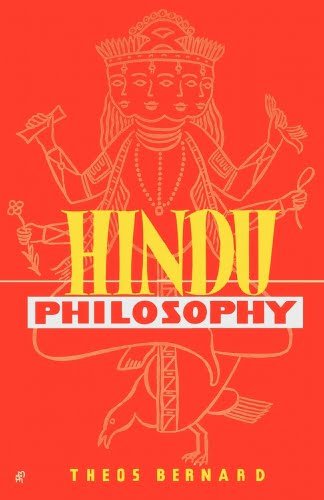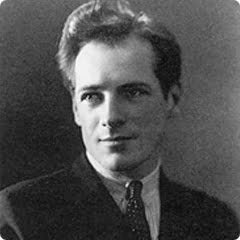Hindu Philosophy by Theos Bernard

Hindu Philosophy
Who were India’s foremost thinkers? What systems did they establish? What problems have agitated the minds of India’s philosophers, intellectuals and mystics? Tersely and in pleasing style Dr. Bernard has answered these questions satisfactorily alike to the layman and the special student of India and her philosophic life without effecting a compromise with Western philosophy and its narrow categories. Moreover, the important Kashmir Shaivism, so long omitted from works on Indian Philosophy, has at last been given its due here. In a sense, a major portion of the book is also dictionary―a dictionary of Sanskrit philosophical terms, arranged alphabetically, explained as to grammatical construction or composition, and defined, often with the emphasis on special meanings within the different types of philosophy.
Book Details
Author: Theos Bernard
Print Length: 213
Publisher: The Philosophical Library
Original source: http://cincinnatitemple.com/articles/HinduPhilosophy.pdf
Submitted by: Robert
Book format: Pdf
Language: English
Book Download
Contents
PREFACE
INTRODUCTION
- Purpose of Hindu Philosophy
- Test of Philosophy
- The Darśanas
- Influence
- Sarhkara
- Ramanuja
- Madhva
- Kāśmīr Saivism
- The Tantras
- Saivism
- Śāktism
- Vaisnavism
NYĀYA
VAIŚESIKA
- Paramānus
- Ākāśa
- Kāla
- Dik
- Ātman
- Manas
SĀMKHYA
- Purusa
- Prakrti
- The Gunas
- Mahat
- Ahamkāra
- Manas
- Indriyas
- Tanmātras
- Mahāhhūtas
YOGA
- ]īva
- Gunas
- Citta
- Buddhi
- Ahainkāra
- Manas
- Indriyas
- Tanmātras
- Bhūtas
MĪMĀMSĀ
VEDANTA
- Brahman
- Ātman
- Māyā
KĀŚMĪR ŚAIVISM
- The Siva Tattva
- The Sakti Tattva
- The Sadāśiva Tattva
- The Iśvara Tattva
- The Sadvidyā Tattva
- The Māyā Tattva and Its Evolutes
- The Kañcukas
GENERAL WORKS
- Nyāya
- Vaiśesika
- Sārhkhya
- Yoga
- Mīmāmsā
- Vedānta
- Kāśmīr Sivaism
ABBREVIATIONS AND SYMBOLS
GLOSSARY
Sample
Hindu Philosophy
There is innate in the human heart a metaphysical hunger to know and understand what lies beyond the mysterious and illusive veil of nature. This is true from savage to savant. Each in his own way, according to his own capacity, tries to fathom the eternal mystery of life. From the beginning of time, teachers have endeavored to bridge the gap between the seen and the unseen and to show cause for the inescapable experiences of sorrow and suffering that engulf mankind. But the questions still remain: What is the nature of Reality? What is the nature of human existence? What is the cause of pleasure and pain? How can Liberation be attained?
The solutions and explanations offered by man range from the simplest superstitions to the most subtle philosophical speculations. In the West, man’s perceptual knowledge of the external world has been his measuring rod, his basis for theorizing. The primitive who is unable to see beyond the physical manifestation of forces displayed by nature constructs an animism or a pantheism; the scientist examining the depths of matter with his microscope and sweeping the heavens with his telescope postulates a materialism. Nowhere is there any record. Mystery still remains.
Since the dawn of Western Civilization, there have been few achievements in the realm of philosophy that have been able to outlive the scientific findings of a single century. With the advent of every new discovery, we have to revise our scheme of things. The entire sea of science is strewn with theories that have had to be abandoned because the inventive genius of man has been able to bring to light new facts that would not fit into the previous theories. The latest ideas are always called improvements and ‘evolution.”
The West refuses to accept the postulate that the world of mind and matter is but an appearance of a deeper reality which lies beyond the perception of our senses, regardless of how magnified these may be by powerful instruments of precision. One of the reasons for this is due to the preconceived notion that man cannot know metaphysical truths by direct experience; therefore, at best, metaphysical truths can only be speculations, inferences, or ungrounded faith. Even if it were possible, the West maintains that no man has ever attained such supreme knowledge. Another attitude is that all systems of thought must be mutually contradictive, and that, if one of them be true, the rest must be false. There is little place left for various interpretations of a single philosophy to suit different minds.
In the Orient, it has been accepted that man can know metaphysical truths by direct experience. He need not depend upon speculation, inference, or faith. The literature is replete with the writings of men who are said to know the whole truth of Nature and human existence, and the teachings of these men have been set forth in the philosophical systems of ancient India.
Theos Bernard Theos Casimir Bernard (1908–1947)[1] was an explorer, and author, known for his work on yoga and religious studies, particularly in Tibetan Buddhism. Bernard first trained in law, obtaining a bachelor’s degree in 1931 and embarking on an internship in 1932, but decided instead to pursue an advanced degree at Columbia University. There, Bernard, who described himself as “the first white lama”, became the first American to write a dissertation on the subject of Tibetan Buddhism. In 1936, he toured India and Tibet with his wife, Viola Wertheim Bernard, studying Tantric Yoga in an effort to master its fundamental principles. On his return to the United States in 1937, his experiences were published across the country. In 1939, Bernard opened the American Institute of Yoga and Pierre Health Studios. In 1947, he again visited northern India, on an expedition to the Ki monastery in Tibet in an attempt to discover special manuscripts. In October, while in an area of Pakistan, Inter-communal violence broke out in the section of the hills that he and his Tibetan companion were travelling. It was reported that both were shot and their bodies thrown in a river. He was declared dead several months later, though his body was never found.About Author: Theos Bernard


Leave a Reply
Want to join the discussion?Feel free to contribute!